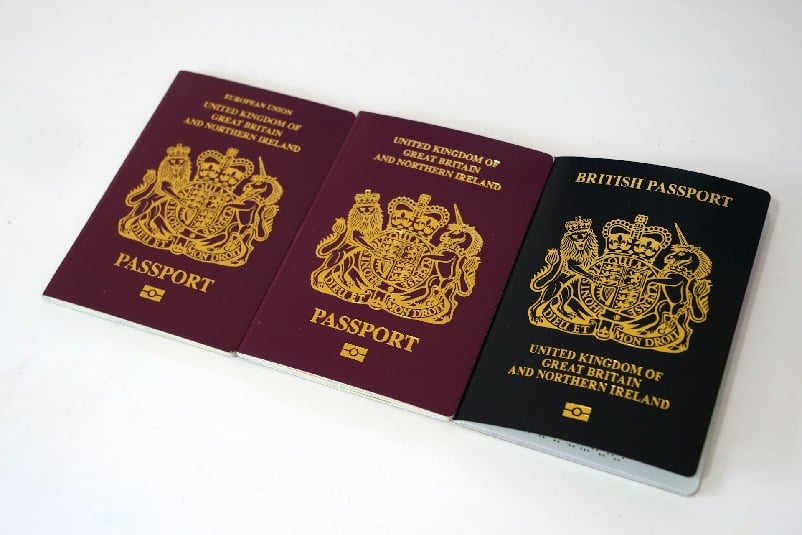Top 10 English Speaking Countries to Live In
English is widely spoken in many locations across the globe and so, for individuals looking to move to an English-speaking country, there are numerous destinations from which to choose. Popular choices include the UK, US, and Canada, although this list is far from exhaustive.
Understanding which country is the right fit for you, and navigating the numerous immigration rules, can often be difficult. Contact IAS today on +44 (0)333 414 9244 to learn more about your full range of options and to get started on your relocation journey.
Read our 1001 reviews
Best English-Speaking Countries to Live In: Overview
For many individuals looking to relocate, moving to an English-speaking country is a top priority. In such cases, there are numerous countries from which to choose, and this article will focus on the United Kingdom, the United States, Canada, Australia, New Zealand, Ireland, India, Malta, Kenya, and Jamaica in particular.
Alongside English-speaking levels, there are a number of other factors which it is also important to consider, such as safety and happiness levels, climate, education and healthcare quality, and geographic location. The countries discussed in this article all have their own strengths and the choice which is right for you will depend on your specific criteria. For further assistance with identifying which country is the right fit for your circumstances, contact IAS today on +44 (0)333 414 9244.
In the following sections, some of the top English-speaking countries are explored in more detail.
United Kingdom
English is the primary language of the UK, although a number of other languages are also spoken in certain regions, including Welsh and Scottish Gaelic. The UK is home to a wide variety of cultures and communities, meaning that many residents also have native languages other than English.
The UK offers a number of benefits, including numerous job opportunities, a high quality of life, easy access to nature, and strong travel connections.
Popular areas within the UK include London for its cultural richness, Edinburgh for its rich history and beautiful streets, and Liverpool for its warm Northern culture and numerous professional opportunities.
Overall, the UK is likely to be a good match if you are looking for a strong job market, high safety levels, and strong healthcare and education.
United States
The US is another popular English-speaking country, with a high concentration of the world’s English speakers. It also has a large Spanish-speaking population, with areas like California previously having been part of Mexico. Additionally, the US is home to diverse communities from around the world, meaning that a high number of other native tongues are also spoken within the US.
The US is well-known for its world-renowned universities, areas of natural beauty like the Grand Canyon, and the possibility of high earning potential. The healthcare is also world-class in the US, although it can often be expensive.
Hotspots within the US include New York for its rich local culture, stunning skyline, and thriving job market, Seattle for its tech scene, and LA for its West Coast location, famous beaches, and many professional opportunities.
Overall, the US is a good choice for those looking for high earning potential, a large variety of cultures and environments, and easy access to the rest of North America. For those looking to move to a more affordable location, however, the US may not be the best fit.
Canada
Canada is another popular North American English-speaking location. While English is the native language of many residents, there is also a high number of French speakers.
Canada is known for its excellent healthcare and universities, numerous areas of natural beauty, and convenient North American location. However, it can also be very cold, and areas like Toronto can be expensive.
Places like Toronto and Quebec are especially popular areas, both boasting a rich culture and high quality of life. Areas of natural beauty like Niagara Falls are also especially popular.
Overall, Canada is likely to be a good choice if you are happy with a cooler climate and are looking for a high quality of life, warm community, and easy access to nature.
Australia
Australia is a country which is home to both a high number of native English speakers but also speakers of many indigenous languages. It is a warm and welcoming country known for its beautiful beaches, strong surf culture, and vast areas of natural beauty.
For those looking to move to Australia, popular areas include Sydney for its world-famous architecture and strong job market and Perth for its mix of city charm and beach access.
Overall, Australia is likely to be a good choice for those looking for hot weather, an outdoor lifestyle, a friendly environment, and strong healthcare and education. It also boasts easy access to places like New Zealand and Indonesia, although can be difficult to access from many other global regions. As such, it is important to consider your preferred global location before making your final decision.
New Zealand
English is also widely spoken in New Zealand, alongside a number of indigenous languages.
New Zealand scores especially highly for safety and also has excellent happiness, education, and healthcare levels. It is widely regarded as an excellent place to live, with its residents generally experiencing a high quality of life.
Popular areas within New Zealand include Auckland and Wellington. They offer rich cultural scenes, access to beautiful nature, and high safety levels.
Overall, New Zealand is likely to be a good fit for those prioritising high safety levels, a welcoming culture, and a strong culture of outdoor activity. However, it can also be expensive and time consuming to access from much of the world, an important consideration if you wish to maintain strong travel connections with your country of origin.
Ireland
Ireland is another country with a large English-speaking population, although Irish is still also spoken by a number of Irish citizens, and is still taught in schools.
Ireland offers access to a rich cultural and music scene, numerous areas of excellent beauty, and world-renowned universities like Trinity College Dublin. It also ranks as one of the safest countries in the world according to the Global Peace Index.
Popular areas include Dublin, Galway, and Cork, all which offer rich local cultures and easy access to Ireland’s natural beauty.
Overall, it is likely to be a good fit for those looking for high safety levels, a strong economy and job market, and easy access to natural beauty.
India
While English is not the native tongue of many Indian citizens, it is still spoken widely within India, alongside other languages like Hindi, Kashmiri, and Gujarati.
India is a popular choice amongst those looking to move to an English-speaking environment, boasting world-famous food, a rich culture, and numerous bustling city environments.
Popular spots within India include Goa, Delhi, Agra, and Bangalore. Each location offers its own charm, professional opportunities, and rich local culture.
Overall, India is generally a good fit if you are looking for a warmer climate, bustling cultural scene, and more affordable lifestyle costs.
Malta
Malta is another major English-speaking country, though Maltese is also spoken widely. It provides access to a Mediterranean climate, numerous beach locations, and other EU destinations.
Popular locations within Malta include Velleta, Mdina, and Marsaxlokk.
If you are looking for a convenient European base which boasts a Mediterranean climate and lifestyle, rich culture, and numerous areas of natural beauty, Malta may be the right choice for you.
Kenya
Kenya is another country in which English is widely spoken, though many residents have Swahili as their native tongue. The country boasts a warm climate, areas of stunning natural beauty, and easy access to many other African locations.
Popular areas include Nairobi for its cultural richness, Lamu Island for its historical and cultural significance, and Mombasa for its beautiful beaches. Areas of particular natural beauty include Masai Mara, Mount Kenya, and Amboseli National Park.
Overall, Kenya is a good choice for those looking for easy access to stunning nature, a hot climate, more affordable way of life, and a change of pace.
Jamaica
Jamaica has a large English-speaking population, although Patois, a Creole dialect, is also spoken by many residents.
The island boasts a rich cultural scene, many beautiful beaches, a friendly local culture, and a sunny climate.
In general, it is a good choice for those looking for a Caribbean location with a rich and warm local culture. It offers a more affordable lifestyle, relaxed way of life, and numerous areas of natural beauty.
A Concise History of the English Language
The English language has a rich history and has been through many stages. English as we know it today would not be understood by the early English speakers of 450 AD, for example.
In general, English is said to trace back to the 5th Century AD, when the Angles and Saxons settled in Britain. It was later influenced by the French language following the Norman conquest of 1066. The language continued to develop after this point, eventually evolving into English as we know it today.
Even now, the language continues to be spoken widely. Whilst its global prominence was perhaps at its peak during the height of the British Empire in the early 20th century, it is still a major trade and social language, spoken in numerous global contexts and regions. It also continues to develop, with new English words added to the Oxford English dictionary on a yearly basis.
While other languages, such as Mandarin, now increasingly take an important global role, English continues to be an important global language with a rich history.
The Significance of English in the Modern Era
While English does not have the global prominence it once did at the peak of the British Empire, it is still widely spoken amongst numerous global contexts.
In countries such as the UK, US, and Australia, it is the primary language spoken by the majority of residents. But its global significance goes beyond that.
For one, much global trade takes place in English, largely on account of English being the primary language of the US. English is often also used as a bridge language by travellers with two different native languages, allowing them to bridge their communication divide.
In many tourist areas, such as Athens and Paris, English is also used as a common language, even amongst individuals whose native tongue is a different language.
Speaking English can provide a variety of professional and educational opportunities. In major cities such as Berlin, for example, speaking English is often an expectation in many corporate roles, even though English is otherwise regarded as a foreign language. Many non-English speaking countries also offer a number of university courses in English, such as Italy, Spain, and Greece.
Overall, English is still a significant global language which opens many doors to its speakers. While other languages are increasingly important on the global stage, such as Mandarin, English still occupies a prominent spot. Even in countries where it is not the official language, it is often still spoken widely.
The Three Circles of English Influence
There are three circles of English language across the globe: inner, outer, and expanding.
Inner refers to countries where English is the native language, such as the UK, US, and Australia. Speaking English is generally essential on a day to day basis in such countries, and official political and social processes will generally take place in English, though translation services may also be available.
Next there is the outer circle. Such countries will generally be ex-colonies of inner-circle countries such as the UK. While English may not be the native tongue of the average citizen, it is still widely spoken, and many official activities take place in English; government offices may use English, for example. Examples of outer circle countries include India and Kenya.
Finally, there is the expanding circle. This circle contains countries which, generally speaking, will not have a major colonial history with countries in the inner circle, and official activities will not generally take place in English. Nonetheless, English may still be taught as a second language, and citizens may be encouraged to learn English in order to access the communication benefits. Examples of expanding circle countries include China and France.
Overall, there are numerous global contexts in which English is widely spoken. If you are looking to move to a country in which English is the primary language, you should consider moving to an inner circle country. However, even if you opt for a country in either the outer or expanding circle, you may still find that English is spoken and understood to a sufficient extent to meet your needs, depending on the country and region in question.
Distribution of English Speakers in Specific Regions
English is spoken widely in numerous global contexts, but a number of English speakers are most concentrated in certain regions in particular.
According to the World Population Review, the US has 297 million native English speakers and Canada has 30 million. The UK has approximately 60 million. Australia has 22 million and New Zealand has 4 million. Jamaica, the Caribbean’s largest island, has approximately 2 million English speakers, though Patois is also widely spoken. In India, the number of English speakers is estimated at 265 million, though it is also home to many other languages, including Hindi and Punjabi.
Many European destinations also have high numbers of English speakers, including Germany with 48 million speakers, Italy with 20 million speakers, and French with 25 million speakers.
Overall, many countries across the world have a significant number of English speakers. This increases the number of countries to which English speakers can successfully move, though integration will likely be easier in countries where English is the native language.
Safest English Speaking Countries to Reside in
Alongside linguistic compatibility, many English speakers looking to move abroad also prioritise safety levels when choosing their next destination. Numerous factors contribute to safety and different people may prioritise different variables.
The Global Peace Index provides a helpful insight into safety levels in different countries around the world, as the index is calculated using a wide range of factors. These include incarceration rate, violent protests, political unrest, and perceptions of criminality.
According to the Global Peace Index, the following 10 countries are the safest in the world in 2025:
- Iceland
- Ireland
- New Zealand
- Austria
- Switzerland
- Singapore
- Portugal
- Denmark
- Slovenia
- Finland
Of the English-speaking countries discussed in this article, Ireland and New Zealand take the top spots. However, a number of the other countries in the list also have high levels of English speakers, such as Singapore and Austria.
Happiest English-Speaking Countries to Reside in
For those looking to move overseas to a new country, the country’s English level is generally only one of a number of priorities. Another popular priority is choosing a country with high average happiness levels.
According to the World Happiness Report, the 15 happiest countries in 2024 were as follows:
- Finland
- Denmark
- Iceland
- Sweden
- Netherlands
- Costa Rica
- Norway
- Israel
- Luxembourg
- Mexico
- Australia
- New Zealand
- Switzerland
- Belgium
- Ireland
Of the countries explored in this article, then, Australia, New Zealand, and Ireland all take the top spots. Many of the other countries in the top 15 fall within the expanding circle of English speaking, meaning that while English may be understood by a number of residents it is not necessarily widely spoken and communication in English may be difficult.
The World Happiness Report takes into account a variety of factors when calculating average happiness levels in different countries, including social support, freedom, generosity, healthy life expectancy, and perceptions of corruption.
Overall, if you are looking for an English-speaking country in which average happiness levels are particularly high, Australia, New Zealand, and Ireland are likely to be good choices.
Conclusion
English is still widely spoken in many global contexts. Whether it is spoken as the native language or widely spoken alongside a different mother tongue, there are numerous countries in which it is still spoken by many residents.
If you are looking to move to an English-speaking country, popular choices include the US, Canada, Ireland, and Australia. However, there are many other countries in which English is widely spoken, such as Germany, even if it is otherwise regarded as a foreign language.
Overall, when deciding on your next destination, you should make sure to account for a wide range of factors, including safety and happiness levels. English-speaking proficiency is likely to be one factor of many.
How Can IAS Help?
If you are an English speaker looking to move abroad, it is likely you are hoping to choose a country in which English is widely spoken. This leaves you with many choices, including Canada, Ireland, and Australia. Each country offers a number of benefits, including high quality of life, strong local culture, and excellent healthcare and education.
However, navigating the immigration rules of a new country can often be difficult. At IAS, our experts have many years of experience and can help you to navigate the entire process, from choosing the right country to helping you to integrate once you arrive. Contact us today on +44 (0)333 414 9244 to learn more about our full range of services and to take the first step in your relocation journey.
Table of Contents
Table of Contents will appear here.Legal Disclaimer
The information provided is for general informational purposes only and does not constitute legal advice. While we make every effort to ensure accuracy, the law may change, and the information may not reflect the most current legal developments. No warranty is given regarding the accuracy or completeness of the information, and we do not accept liability in such cases. We recommend consulting with a qualified lawyer at Immigration Advice Service before making any decisions based on the content provided.
Services we Provide
Frequently Asked Questions
English is spoken in numerous global contexts, at different levels of fluency, and so it is difficult to say for certain how many English-speaking countries there are. Even countries which do not have English as a primary language may still contain high levels of English comprehension, for example.
According to the UK government, however, there are 19 countries which are considered to be native-English-speaking for visa purposes. These 19 countries are as follows:
Antigua and Barbuda, Australia, the Bahamas, Barbados, Belize, Canada, Dominica, Grenada, Guyana, Ireland, Jamaica, Malta, New Zealand, St Kitts and Nevis, St Lucia, St Vincent and the Grenadines, Trinidad and Tobago, the United Kingdom, and the US.
Learning English provides a number of advantages, even if English is not widely spoken in your country of origin. For one, it opens up numerous professional opportunities, providing you with a route to employment in countries like the US and UK. Additionally, it can also open up educational opportunities in countries overseas, allowing you to attend English-speaking universities.
Speaking English can also provide you with a bridge language when meeting people whose native tongue is different to your own. When travelling overseas, you may find it easier to communicate with the people whom you meet if you are able to share in English as a common language.
English language requirements vary significantly between country and visa type. In the UK, for example, certain visas require proof of sufficient English language ability. Additionally, you will need to demonstrate sufficient English proficiency in order to obtain permanent settlement status and British citizenship.
For more information on the English language requirements for your chosen route, contact IAS today on +44 (0)333 414 9244.
















